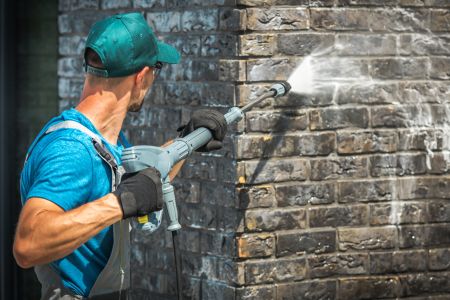How To Care For Brick Surfaces

Brick walls and pavers can give your home a stately appearance. Beyond its aesthetic appeal, however, brick has the added benefit of being relatively low-maintenance. It's one of the reasons it has remained a popular building material throughout the centuries.
That said, brick is a semi-porous material and is not immune to damage. However, by taking just a few precautions and extra steps to protect your home's brick areas, they will remain sturdy and safe for decades to come.
Seal Brick To Protect It From Water Damage
Brick can become weakened if exposed to too much moisture, and this is especially true if exposed to water with high mineral content, as the crystallized minerals will break them down. To protect against this, thoroughly clean your brick and then coat it with a quality brick sealant, rolling it over the area to ensure even coating. Allow the first layer to dry, then go back over it once more with an additional coat.
Repoint The Mortar As Needed
If you have brick walls on your home, keep an eye on the quality of the mortar. Is it crumbling or damaged? If so, simply putting an extra layer of mortar over it won't help protect its integrity. The old mortar can still crumble underneath the new, compromising the integrity of your walls. You need to get the damaged mortar fully replaced with new mortar. This is called repointing.
Because repointing is a delicate process, we recommend hiring a contractor for the job. This is especially important if you have an older or historic property, as they will need to match the new mortar to the original. By getting old mortar repointed, as opposed to just covering up cracked spots, you're keeping the structural integrity of your brick walls intact.
Keep Grass And Moss From Growing On Your Brick Pavers
If you have brick pavers on your property, it's important to not let grass, weeds, and moss grow in the cracks. Not only is it ugly, but it can contribute to the brick breaking down over time.
To protect your brick pavers from being overtaken by plant growth, coat them with a polymer sealant. We also recommend sealing the cracks between the bricks with a filler that discourages plant growth, such as polymer sand. Sweeping off plant life, dirt, and debris from your pavers also decreases the probability of unwanted plant growth.
Clean Up Algae And Mildew ASAP
Algae and mildew are especially harmful to your brick. They slowly but surely break down the brick, penetrating the surfaces and softening the brick from the inside. Their presence is bad news for your brick surfaces. The most thorough way of killing algae, mold, and mildew is with pressure washing. Most other cleaning methods, such as sandblasting or muriatic acid treatment, are too abrasive and can damage the brick.
Your contractor should coat the area with an anti-microbial and anti-fungal detergent first to ensure that any mildew that got through the surface of the brick is killed off too. Once that's done, the stains should simply wash away along with any remaining spores.
Power Clean Pressure Wash wants to help our clients by helping them keep their home's brick areas beautiful and structurally sound. That's why we provide brick and paver washing for our clients.
If you're interested in having Power Clean Pressure Wash care for your home's brick surfaces, give us a call for a free quote. Our professional pressure washing is a safe and dependable way to protect your brick from algae, mold, moss, and other harmful substances.
